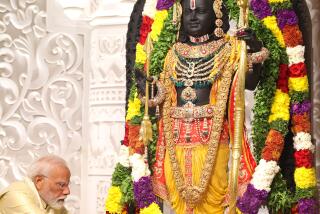A National Tragedy, Beyond Gandhi : India: It has not had the leadership its democratic impulses deserve. Rajiv Gandhi at first saw the big picture, but ended a mere political tactician.
- Share via
In his great novel, “Passage to India,” E. M. Forster wrote of India as “swelling here, shrinking there, like some low but indestructible force of life.” It was probably not a fair description, even in the old days of the British Raj, but it is one that many observers will subconsciously resort to as they contemplate the murder of former Prime Minister Rajiv Gandhi.
Yes, India will survive and outlive one terrible murder, but not for the reason, as the caricature would have it, of an inert mass simply swallowing the memory into the dark hole of its overwhelming numbers and unfathomable poverty.
India, if it ever was, is no longer like that. Its 500 million voters are as sophisticated as the members of any democracy anywhere--not good on details, but quite able to get the sense and drift of major events when things go badly wrong. This is why Rajiv’s mother, Indira, got the boot in 1977. Her overwhelming arrogance had led her to make two fundamental mistakes--the state of emergency that for a while suspended democracy, and her male sterilization campaign. This, too, is one major reason why Rajiv lost the premiership 18 months ago, when he mistakenly thought the voters would not pay attention to the serious allegations that high members of his entourage had profited from kickbacks.
India’s tragedy is, like many other democracies before it, that it has not always got the direction and policies from the top its democratic impulses deserve. When the politicians don’t give an honest and inspiring lead, the voters are able to say no, but saying yes is more difficult, since they have no idea what they are supposed to be saying yes to.
George Kennan once observed that America remained unnecessarily hostile toward the Soviet Union for so long because the need to maintain popular appeal in such a large and diverse country pushed would-be officeholders to opt for “lowest common denominator” politics. Antipathy to communism and all its works was an easy sell.
India has suffered the same syndrome. Substitute Pakistan for Russia and Islam for communism and you have it. Sadly, Rajiv Gandhi fell into this populist trap. He had the chance, taking over in a great wave of sympathy after the assassination of his mother, to weave a new understanding with Pakistan. But step by step, attempting to placate radical Hindu nationalism, he edged away from the big decisions--flexibility over the disputed border state of Kashmir and reduced military spending that would have made a rapprochement possible. Similarly, in the Punjab his inability to stand up to the Hindu backlash stopped him from carrying through an already negotiated peace settlement with the disaffected Sikhs. Now both the Punjab and Kashmir boil away, one threatening to tear India’s army apart, the other to bring closer the day of another destructive war with Pakistan, one that could all too easily go nuclear.
Gandhi, who started his days in power seeing the big picture, which his mother never really did, ended up partly like her, a mere political tactician.
The political class in India appears to work on the assumption that the voters will not be interested if it steps toward the high ground. But with two Gandhis murdered, the negative politics of maneuvering in the valley is at a dead end.
With Rajiv Gandhi’s death, and with it the probable demise of the hold of the old Congress-I party--Sonia Gandhi’s election as its head is a sign of utter desperation--India has a chance to reshape its politics. It needs to throw up younger leaders from a new school, who really believe that they know how to release the immense creative energies of this half-awake giant and make it what it could be, the greatest economic growth story of Asia and a vibrant, constructive democracy.
India, despite the poor witness of this election campaign, is anything but a “low but indestructible form of life.” One day, given the right prime minister, it will discover its worth.
More to Read
Sign up for Essential California
The most important California stories and recommendations in your inbox every morning.
You may occasionally receive promotional content from the Los Angeles Times.













